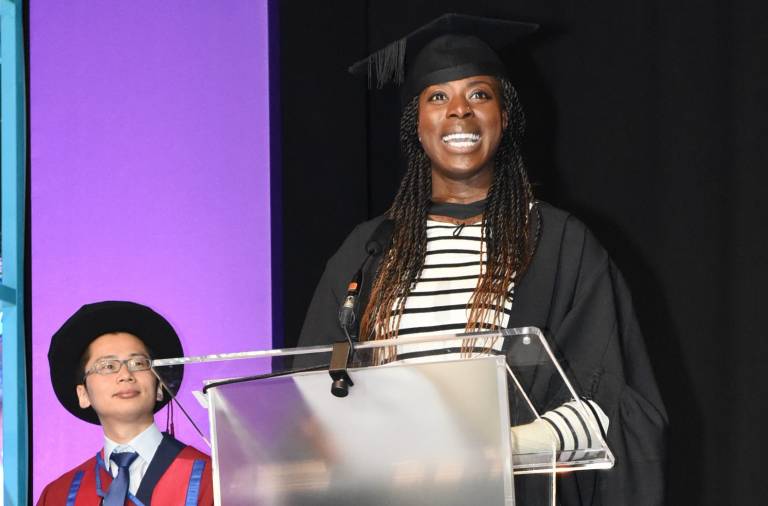DeepMind: unlocking the future
How DeepMind is shaping and supporting the next generation of scientific minds at UCL.

18 July 2021
Artificial intelligence company DeepMind is transforming the world we live in.
The company is safely advancing the capabilities of artificial intelligence (AI) to help us answer some of life’s most challenging problems. From the AlphaGo computer programme, which proves AI can learn and better its decision-making process when faced with complex situations, to AlphaFold, which uses AI to accelerate new scientific discoveries such as finding cures for rare diseases and discovering new drugs.
DeepMind is also invested in shaping the industry – with a commitment to improving equality, diversity and inclusion among the next generation of computer scientists. And that’s why a continuing partnership with UCL is integral to the company’s vision.
Where it all began
The relationship between UCL and DeepMind began when CEO Demis Hassabis (UCL Neuroscience 2009) met co-founder Dr Shane Legg (UCL Honorary Fellow 2016) in UCL’s Gatsby Computational Neuroscience Unit in 2009, and the ties have remained strong ever since.
Sylvia Christie, Education Partnerships Manager for DeepMind, says: “The intersection of neuroscience and AI is a topic of focus at DeepMind, and the calibre of UCL’s research on both subjects has led to many collaborations between us.”
Over the years, the company has grown from an ambitious start-up to a major player in the field of AI – with a long-term goal to help society find answers to some of the world’s most pressing and fundamental scientific challenges.
Sylvia says: “Take the problem of protein folding. Misshapen proteins can spell illness or death for an organism, so understanding the structure of a protein means understanding the mechanisms of many diseases. Building on 50 years of academic breakthroughs, our team is researching how AI can be applied to predict the 3D structure of any protein, based solely on its genetic sequence.
“By solving the most fundamental of scientific questions like this, AI could unlock the solutions to countless others. To those working at DeepMind, this is the definition of transformative.”
The company joined forces with Google in 2014 and is now a subsidiary of its parent company (Alphabet Inc.) which continues to support DeepMind’s relationship with UCL.
Inspiring a generation
DeepMind has made a number of gifts to UCL since the beginning of UCL's It’s All Academic fundraising campaign. Financially, they support students on Neuroscience, Computer Science, and Science, Technology and Society postgraduate courses, and the Centre for AI. They also run the wider DeepMind Scholarship Programme, which creates opportunities for students studying all over the world, including Africa and Latin America.
“Currently, the AI sector is not representative of the wider world. These imbalances aren’t random, they are the result of structural inequalities,” Sylvia says. “That’s why our scholarships aim to support underrepresented students – spanning gender, race, ethnicity, and socio-economic background.
“By removing some of the financial barriers that prevent people applying, and providing mentoring and support, we hope the DeepMind Scholarship Programme will help build an AI community where everyone can participate – irrespective of their backgrounds.”
DeepMind and UCL also have a comprehensive academic relationship, with the company’s scientists teaching courses in AI and collaborating with the university to deliver a full lecture series to students and the wider community each year.
Sylvia says: “For AI to live up to its potential, we need a thriving research ecosystem, which means contributions from different perspectives and environments, both in academia and industry.”
Indeed, UCL and DeepMind came together in 2018 to undergo a joint research project into grid cells - the key to mammals’ internal navigation systems - which was published as a paper in scientific journal Nature. And further deepening the partnership, in 2019 the company established the DeepMind Chair of Machine Learning and Artificial Intelligence at UCL to support our research in the field. Professor Marc Deisenroth joined as the inaugural Chair.
Looking ahead
As the emerging technology becomes more embedded in our day-to-day lives, DeepMind is committed to broadening the industry, making it even more accessible, and doing so in a way that’s safe and ethical.
Sylvia says: “Increasing representation and widening the circles of influence in AI offers a huge opportunity to bring diverse experiences, perspectives, values, hopes, and concerns into conversations about the design and deployment of AI – and this is critical for AI to be a technology that benefits everyone.”
With this as a focus, in February 2020, UCL and DeepMind announced the renewal of their partnership for the 2021/22 academic year.
“Speaking personally, I’m particularly looking forward to seeing what our scholars go on to do with their degrees from UCL in the long term. I hope they make many meaningful contributions to the AI field as well as thriving personally,” says Sylvia.
“I’m really proud of all they have accomplished already, but I know there are even brighter things on the horizon for all our scholars – at UCL and around the world.”
 Close
Close

